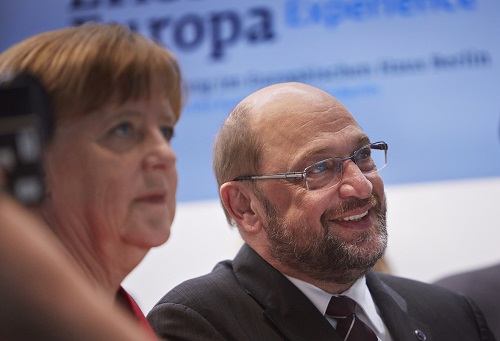
The G20 summit in Hamburg has come to an end, and the dominant story remains America’s withdrawal from the Paris climate agreement. It’s been less reported that some European leaders have implied that the EU should take economic revenge on the U.S. because – in their words – limiting government intervention in the economy is a “market distortion.”
Germany currently holds the presidency of the G20 summit, with Chancellor Angela Merkel overseeing the violence-plagued event. The final declaration notes the U.S. withdrawal, and Merkel has chided President Trump over his decision. But her rival in Germany’s election for chancellor later this year, Social Democratic Party candidate Martin Schulz, has hinted the EU should launch something approaching a trade war in retaliation.
Last month, just before Trump made his final announcement, Schulz said that leaving the Paris climate agreement would give the U.S. economy a competitive advantage over nations that kept its terms – and he viewed this as most unfair. “If Mr. Trump wants to leave the climate pact, then we must talk openly about trade relations and market distortions,” Schulz said. (Emphasis added.)
That wording is significant. It uses the economic term “market distortion” in the opposite sense of its denotative meaning. Investopedia defines a market distortion as:
an economic scenario that occurs when there is an intervention in a given market by a governing body. The intervention may take the form of price ceilings, price floors, or tax subsidies. Market distortions create market failures, which is not an economically ideal situation.
The Paris climate agreement would set limits on carbon dioxide emissions, with changes in developing nations offset by funding from the U.S. and other developed nations. It is, in brief, a market distortion.
As Investopedia states, “There is a tradeoff that regulators must make when deciding to intervene in any given marketplace.” Many American leaders and the “G19” believe the benefits of reduced carbon emissions justify the economic costs.
However, if we are to advance the public discussion in any meaningful way, we have to speak truthfully. Withdrawing from a market distortion does not create a market distortion. It averts one.
It is important that we tell the truth, not just because honesty and economic literacy demand that we use the linguistic equivalent of “just balances, just weights.” It is vital in order to assess European leaders’ outlook and the treaty’s impact for good or ill.
All politicians believe in market distortions to a degree. Merkel, for instance, regards certain policies as prerequisites for international trade deals. “A modern trade agreement has to be about more than cutting tariffs,” she said in May before the Labour 20, a conference of international trade unions in the G20. “It should also be about environmental and consumer standards.”
But between the words of Schulz, who is running to Merkel’s left, lies the unspoken assumption that the laws of economics are written by experts in political tribunals, free from the vagaries of supply and demand, consumer choice, or firms’ capacity. Their policies take precedence over the market, which “distorts” their preferences. And those who demur from their decrees, wherever they live, deserve to be punished.
Using proper economic terminology is also important to analyze the agreement’s real impact on the human person. “The free market is an institution of social importance,” according to the Compendium of Catholic Social Teaching, “because of its capacity to guarantee effective results in the production of goods and services.” Market distortions are not merely bad in the abstract, because they cause theoretical and mathematical inefficiencies. They impose a real social cost. Nations that reduce carbon emissions, for example, may have to divert resources they would have used to produce goods or services into retooling plants, in order to abide by the agreement’s terms. Or they may simply continue using current technology and reduce overall production levels. In either case, the result is fewer goods being created to fill human needs and desires, creating shortages or raising prices.
Those committed to seeing people harness their God-given talents to thrive through innovation want to minimize market distortions. But to oppose them, we must first accurately understand what they are.
(Photo credit: Martin Schulz sits next to Angela Merkel. Courtesy of Erlebnis Europa. Public domain.)

